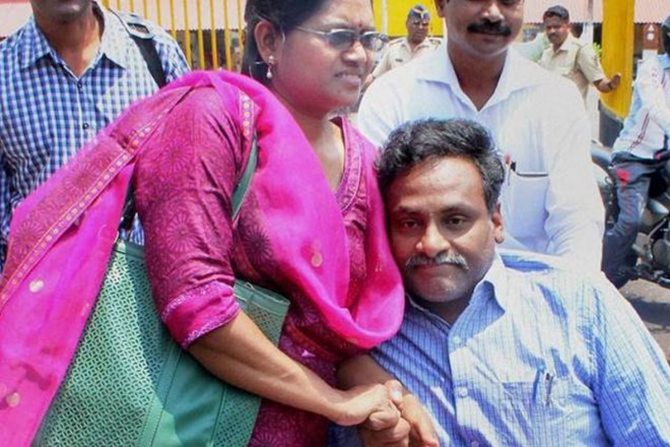It took a five-day hunger strike by the former Delhi University professor, in jail without a break for five years after being convicted of links with Maoists, for the jail administration to agree to his request for a water bottle.
Jyoti Punwani reports.

Can a 90% handicapped convicted prisoner be denied a plastic water bottle in a jail cell where temperatures can touch 48 degrees?
Yes, if the prisoner is Professor G N Sai Baba and the jailors are those in charge of Nagpur Central Jail.
It took a five-day hunger strike by the former Delhi University professor, in jail without a break for five years after being convicted of links with Maoists, for the jail administration to agree to his request for a water bottle.
That wasn't Professor Saibaba's only demand.
The wheelchair bound professor was on hunger strike protesting against the CCTV installed suddenly outside his cell last week, which left him with no privacy.
Why was the CCTV suddenly installed?
The sequence of events is revealing.
In Nagpur's hot nights, the professor, known for speaking up for Adivasis' rights, thought a water bottle could quench his thirst and obviate the need to wake up his attendants, without whom he cannot function.
But that was too much for jailors who have so far thought nothing of denying him medicines, including a hand weight prescribed for his useless arm, shampoo, books, letters, a towel, napkins and handkerchiefs, a t-shirt and a woolen cap in winter.
A day after the news of their denying him a water bottle was reported in the media, the CCTV made its appearance.
Every time he needed to relieve himself, explained his lawyer Akash Sarode, he had to put up a curtain to block the CCTV.
"A CCTV positioned outside a high security cell in which is lodged a 90% handicapped prisoner!" exclaims Vasantha, his wife. "What could be the aim except to humiliate him?"
After Vasantha and Sarode wrote to the home minister last week, the CCTV was kept a little distance away, but it could still capture the goings on in the Anda cell. So Professor Saibaba decided to protest the only way he can: Through a hunger strike.
This is the third time the indomitable prisoner has resorted to this extremely tortuous form of protest. This time, after four days, he started passing blood stained stools, and had to be admitted to the prison hospital.
After this, the direction of the CCTV was changed.
The professor's last hunger strike in October 2020 brought forth a promise that his demands would be fulfilled, which turned out false. He therefore recently wrote to the home minister and the additional director general of prisons, Pune.
According to his lawyer, these letters were returned to him.
Now, his lawyer has been told that he must write once again to them.
***
Professor Saibaba is like no other prisoner.
After a childhood polio attack left him paralysed waist down, he remained wheelchair bound, but was able to teach in Delhi University till 2014, when Maharashtra police picked him up from his residence. He spent the next 18 months in jail (but for a six-month gap), which left his left hand dysfunctional, besides aggravating his overall health.
The professor was barely recovering from this prolonged trauma after receiving medical bail from the Supreme Court, when he was convicted in March 2017 by the Gadchiroli district and sessions court after a trial reportedly rife with irregularities, and sentenced to life.
He has since been denied medical bail and parole. He has as many as 19 ailments, including severe heart and kidney problems, besides a non-functioning arm. He has had fainting spells frequently. The Nagpur government hospital has said it cannot treat his multiple ailments.
In November 2020, the hospital prescribed an angiography for him to be performed at the Indira Gandhi Government Medical Hospital. The jail authorities never took him there.
Earlier, in August 2020, when his mother was dying of cancer, he was not even allowed a video call to her, let alone parole to meet the person who had nurtured him and taught him how to deal with his affliction from childhood.
His parole application has been rejected thrice. Three appeals by UN human rights advocate have had no effect.
In April 2021, he was sacked from his job.
As if his sufferings were not enough, the Nagpur jail authorities have kept him in the high security Anda Cell, where no fresh air or sunlight reaches, and where temperatures reach extreme levels. Professor Saibaba has had fainting spells in the past, and has contracted Covid in jail.
The cell is also too small for him to move around on his wheelchair.
"We are only asking for his legal and Constitutional rights," emphasises Vaantha. "A transfer to a normal barrack outside the Anda Cell; a transfer to Cheriapally Central Jail, Hyderabad, so that his brother can visit him; medicines and books. But in our experience, Maharashtra's jail authorities are adept at torturing prisoners."
Feature Presentation: Aslam Hunani/Rediff.com










 © 2025
© 2025